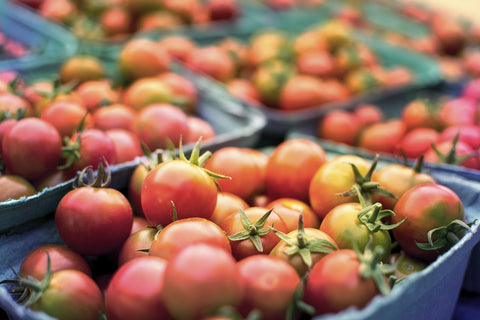
10 Easy Ways to Reduce Plastic Waste in Your Daily Life
Each year, our planet churns out a staggering 400 million metric tons of plastic waste - that's quite a lot, isn't it?
Plastic is literally everywhere, from our kitchens to our oceans, and its impact on our environment is devastating. But don't worry, it's not all doom and gloom. The good news is that each one of us can play a part in turning the tide.
Today, we're going to share a few simple ways to reduce plastic waste in your daily life. These aren't complex or time-consuming tasks. Instead, they're simple, practical changes that anyone can incorporate into their daily routines. So, whether you're a seasoned eco-warrior or a green newbie, there's something here for you.
Let's embark on this journey together towards a cleaner, greener, and more sustainable future. Ready? Let's dive in!
10 Easy Ways to Reduce Plastic Waste in Your Daily Life
- Say no to straws
- Bid 'goodbye' to disposable razor
- Say 'hi' to waste-free
- Start composting trash
- Switch to cloth diapers
- Place vegetables right into your cart
- Bring your own cloth shopping bags
- Buy Bread in Paper Bags (or Make Your Own)
- Shop at a Farmer’s Market
- Shop in Bulk
1. Say no to straws

Next time you order a cool beverage, you could ask servers not to include a single-use plastic straw. Make sure you mention this before they whip up your drink. If the straw is already plopped in when it arrives, chances are, it might end up as plastic waste.
2. Bid 'goodbye' to disposable razors
Many people are making the switch to safety razors these days. These nifty tools, usually crafted from stainless steel, come with replaceable blades. Sure, they might seem a bit pricier than the disposable ones initially, but guess what? Over time, they can actually be quite a money-saver.
3. Say 'hi' to waste-free period
Say goodbye to single-use, disposable items and hello to a wide range of waste-free alternatives. Whether you're intrigued by innovative choices like menstrual cups or period panties, or prefer zero waste versions of classic pads and tampons, rest assured there's a green solution out there that suits every woman's comfort zone.
4. Start composting trash
When composting, it's important to select the right food scraps. Stick to plant-based items like vegetable and fruit peels, but avoid citrus fruits, onions, garlic, meat, dairy products, greasy foods, bones, and pet waste as they can disrupt the composting process. To help these materials decompose faster, cut or shred them into small pieces. Start your compost pile by digging a hole about 12 to 14 inches deep and burying your organic waste.
Maintain a ratio of two to three parts "brown" (carbon-rich) materials to one part "green" (nitrogen-rich) materials. Cover and bury your food scraps in the pile to speed up the decomposition process. (source: Composting 101)
5. Switch to cloth diapers
Embracing cloth diapers is a wonderful illustration of eco-friendly parenting. It's a compelling way to show how pivotal it is to minimize waste and safeguard our environment.
By choosing cloth over disposable diapers, you're not only diminishing landfill waste but also conserving natural resources, lessening exposure to chemicals, and championing a more sustainable approach to raising your little ones.
6. Place vegetables right into your cart
By placing produce straight into your cart, you're doing a world of good for our environment. You're saying no to those plastic bags at the store, which often end up in landfills or as litter. Plus, it nudges you to opt for whole fruits and veggies instead of the pre-packaged ones, helping to cut down on extra plastic and energy used in processing.
7. Bring your own cloth shopping bags
This simple act helps save resources used in making and disposing of plastic bags, and reduces plastic pollution. Cloth bags are durable, reusable, and a greener alternative to single-use plastic bags. They also make sure less plastic ends up in landfills or harming wildlife. Remember though, to make the most out of your cotton bag, aim to reuse it at least 7,100 times to truly offset its environmental impact. (source: A 2018 Danish Environmental Protection Agency)
So, don't forget your stylish and handy cloth bags next time you pop to the store - our planet will thank you!
8. Buy Bread in Paper Bags or Bake at Home

Opting for paper bags for your bread or baking it at home helps reduce plastic waste, as bread is often packaged in plastic which is not environmentally friendly if not recycled correctly, unlike biodegradable paper bags. Additionally, it's a wonderful way to support local businesses and reduce packaging waste. Baking your own bread allows you to choose organic or locally-sourced ingredients, thereby decreasing the carbon footprint from ingredient transportation.
Paper bags also promote buying only what you need, potentially reducing food waste. Keep in mind, though, while paper is generally more eco-friendly than plastic, its production can be resource-intensive. So, for an even greener option, consider reusable bread bags made of fabric or other sustainable materials.
9. Shop at a Farmer’s Market
Choosing local food is a wonderful way to show some love to our planet. Since it doesn't have to journey far to reach your table, it helps cut down on greenhouse gas emissions, making our carbon footprint a bit lighter. Plus, it's a fantastic way to boost the local economy and lend a helping hand to our neighborhood farmers and producers. It's a win-win!
10. Shop in Bulk
Shopping in bulk is not only great for your pocket, but it's also a friend to Mother Earth. It's a smart strategy that cuts down on the excess plastic packaging that typically comes with supermarket goods. Plus, you get to buy just the right amount you need, which means less food gets tossed away and more money stays in your wallet.
And let's not forget about the reduced number of delivery trips, which helps lower carbon dioxide emissions - a win for our environment!
MamaSuds Takeaway
It's clear that reducing our plastic waste doesn't have to be an overwhelming task. It's about making small but meaningful changes in our daily lives - saying no to straws, embracing reusable items, shopping locally, and much more. Each of these steps may seem insignificant on their own, but when combined, their impact is truly monumental.
Let's remember, the journey to a greener and cleaner planet starts with us, in our homes, in our choices. So let's step up, take action, and make every day a day for our Earth. After all, there's no Planet B. So let's protect and cherish our only home, one plastic-free step at a time.



Leave a comment